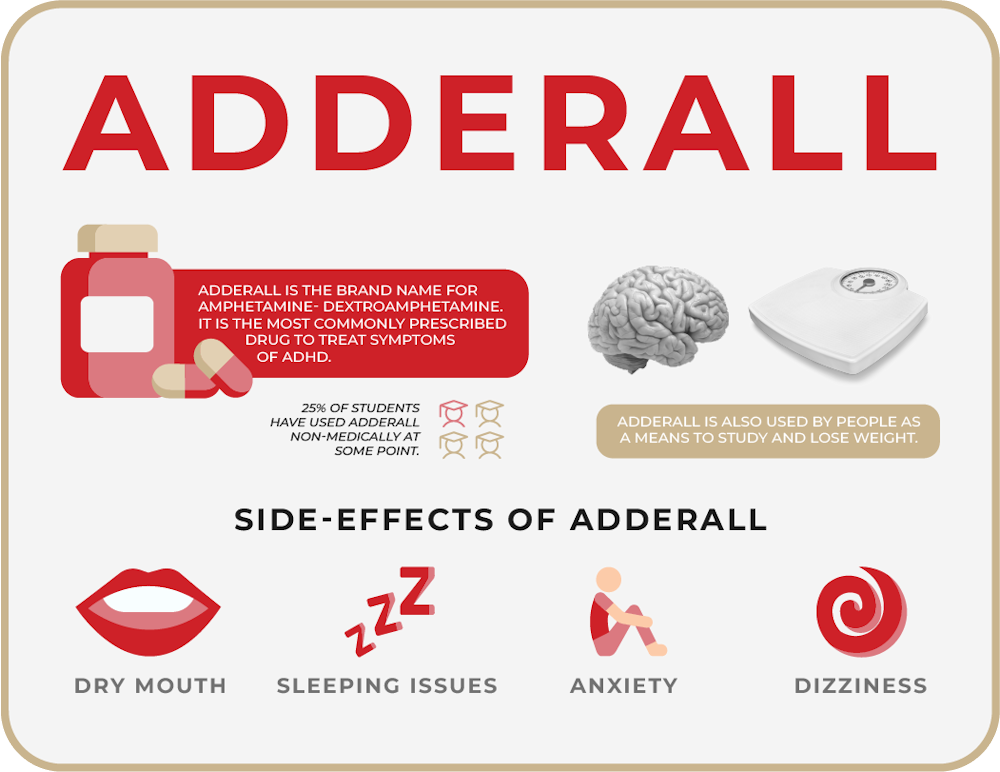The Long-Term Effects of Adderall Use
Adderall may seem like a miracle drug, but there’s a lot you should know about the long-term effects before deciding to make it a habit.
Sure, in the short term, Adderall can make you feel like a rock star – you’re focused, energized, and ready to take on the world. But keep using it, and you may find yourself addicted, anxious, and struggling with memory problems, not to mention a host of physical issues. The high eventually wears off, but the damage to your body and mind can be permanent.
If any of this hits close to home, it’s time to have an honest conversation with your doctor about safer alternatives and whether Adderall is still right for you. The truth is, what seems like a quick fix now may end up costing you down the road. If you are having trouble stopping the use of adderall, we offer various addiction treatment programs in Indiana that can help you or your loved one.
Table of Contents
ToggleWhat Is Adderall and How Does It Work?
Adderall is a stimulant medication prescribed for the treatment of attention deficit hyperactivity disorder (ADHD). The active ingredients in Adderall are amphetamine aspartate monohydrate, amphetamine sulfate, dextroamphetamine saccharate, and dextroamphetamine sulfate. These substances work by increasing the levels of certain neurotransmitters in the brain, specifically dopamine and norepinephrine.
By increasing the levels of dopamine and norepinephrine, Adderall helps improve attention, reduce hyperactivity, and enhance impulse control in individuals with ADHD. The exact mechanism of action is not fully understood, but it is believed that the medication increases the release and blocks the reuptake of these neurotransmitters, prolonging their effects in the brain.
Adderall is classified as a controlled substance because it has the potential to be abused and lead to dependence. It should only be used under the supervision of a healthcare professional, and the dosage should be carefully monitored to avoid misuse or addiction.
What are the Short-Term Effects of Adderall?
Adderall can have short-term effects on individuals who take it. These effects can vary depending on factors such as dosage, duration of use, individual physiology, and the specific medical condition being treated.
Some possible short-term side effects of Adderall include:
- Increased focus and attention: One of the primary short-term effects of Adderall is an improvement in focus and attention. It can help individuals with ADHD concentrate on tasks, stay organized, and reduce impulsivity.
- Increased energy and wakefulness: Adderall is a stimulant, so it can increase energy levels and reduce feelings of fatigue. This effect can help individuals with ADHD feel more alert and awake during the day.
- Elevated mood: Adderall can produce feelings of euphoria and increased motivation in some individuals. This effect is related to the increase in dopamine levels, which are associated with reward and pleasure.
- Increased heart rate and blood pressure: Adderall can cause temporary increases in heart rate and blood pressure. This effect is due to the stimulant properties of the medication and can be more pronounced at higher doses.
- Decreased appetite: Adderall can suppress appetite, leading to a decrease in food intake. This effect can result in weight loss, especially during the initial weeks of treatment.
Are There Any Long-Term Effects of Adderall?

The long-term use of Adderall, especially when taken in high doses or used inappropriately, can potentially lead to several side effects. It’s important to note that not everyone who takes Adderall will experience these side effects, and the severity and occurrence of side effects can vary between individuals. Here are some potential long-term effects of Adderall overuse:
Addiction
Adderall may seem like a miracle drug, but long-term use or abuse can lead to serious problems. Addiction is one of the biggest risks.
- Adderall activates the reward centers in your brain, giving you a euphoric high. This can make the drug highly addictive, even when taken as prescribed.
- People often develop a tolerance, so they need higher and higher doses to get the same effect. This further fuels addiction.
- Withdrawal symptoms like fatigue, depression, and irritability can make quitting difficult. Some continue using just to avoid withdrawal.
The risk of addiction is even higher if you snort or inject Adderall. Misusing the drug this way produces a more intense high that fades faster, quickly leading to addiction.
If you find yourself unable to cut back or quit Adderall, even when you want to, you may be addicted. Talk to your doctor about medication, therapy, or rehab options that can help you break free from this dangerous dependence and get your life back on track. The sooner you make a change, the less long-term harm will be done.
Physical Health Effects
High Blood Pressure
Long-term use or high doses of Adderall can cause an increase in blood pressure. Hypertension, or high blood pressure, often has no symptoms, so the only way to know if it’s a problem is through regular blood pressure monitoring. Over time, high blood pressure places additional stress on the heart and blood vessels. If left untreated, it can lead to heart disease and other health issues. Talk to your doctor about ways to control your blood pressure, which may include medication, diet changes, exercise, and reducing or stopping Adderall use.
Weight Loss and Insomnia
Two of the most common side effects of Adderall are eating disorders such as appetite suppression and sleep difficulties. While modest weight loss or temporary insomnia may not seem concerning initially, long-term changes can become problematic. Significant weight loss or chronic lack of sleep may contribute to irritability, mood changes, and health issues. If you’ve lost a noticeable amount of weight or frequently have trouble falling or staying asleep after taking Adderall for an extended period, speak to your doctor. They may adjust or switch your medication and recommend lifestyle changes to help restore your appetite and sleep schedule. It is not uncommon for clients of FCRC to participate in our eating disorder treatment in Indiana to help with the issues of Adderall.
Reduced appetite and insomnia are common reasons people stop taking Adderall. Don’t ignore these side effects; your physical and mental health depend on eating a balanced diet and getting adequate rest. Be proactive in addressing these issues with your doctor to determine if the benefits of Adderall still outweigh the risks or if it’s time to explore alternative treatment options. Your health and well-being should be your top priorities.
Mental Health Effects
Anxiety and Depression
Long-term Adderall use can exacerbate or cause feelings of anxiety, worry, and depression. The stimulant effects of the drug initially elevate your mood and make you feel good, but over time, it can deplete dopamine and other neurotransmitters in your brain that regulate mood and motivation.
- You may experience periods of increased irritability, restlessness, and trouble sleeping. Feelings of sadness, hopelessness, or excessive worrying can also emerge or intensify.
- If you frequently need to increase your Adderall dose to feel its effects, it can worsen symptoms of anxiety and depression. The higher the dose and frequency of use, the greater the risk of adverse mental health issues.
To minimize these risks, take the lowest effective dose of Adderall possible, avoid escalating your dose quickly, and take occasional “medication vacations” if advised by your doctor. Be open with your healthcare provider about any changes in your mood or mental state. Non-drug strategies for anxiety treatment and depression treatment, such as exercise, mindfulness, and therapy, may also help.
Psychosis
In rare cases, long-term, high-dose Adderall misuse can trigger psychotic symptoms like delusions, hallucinations, and paranoia. This is more likely if you have a history of bipolar disorder or schizophrenia in your family. If you experience a psychotic episode, stop taking Adderall immediately and contact your doctor. Hospitalization and antipsychotic medication may be required to stabilize your condition.
The risks of these mental health effects increase over time and with higher doses. Be vigilant for any significant or persistent changes in your thinking, mood, or behavior. Talk to your doctor right away about alternative treatments or medication adjustments to mitigate harm. Your mental health and well-being should be closely monitored during and after long-term Adderall use.
Sexual Issues
Adderall use has been associated with potential sexual side effects, although these effects can vary between individuals. Some individuals may experience changes in sexual desire, arousal, or performance while taking Adderall. Here are a few ways Adderall may impact sexual function:
- Decreased libido: Some individuals may experience a decrease in sexual desire or interest while taking Adderall. This can result in a reduced interest in engaging in sexual activities.
- Erectile dysfunction: Adderall’s effects on blood flow and cardiovascular function may contribute to difficulties in achieving or maintaining an erection in some individuals. This can lead to erectile dysfunction or problems with sexual performance.
- Delayed orgasm or anorgasmia: Some individuals may find that Adderall delays or inhibits orgasm. This can result in difficulties reaching climax or reduced sexual satisfaction.
It’s important to note that not everyone will experience these sexual side effects, and for some individuals, the impact on sexual function may be minimal. Additionally, these side effects may be dose-dependent, and adjusting the dosage or changing medication may alleviate or reduce the symptoms.
Impeded Growth
There is a concern that long-term use of stimulant medications like Adderall may affect growth and development, particularly in children and adolescents. However, the evidence regarding the impact of Adderall on growth is still limited and not conclusive.
Some studies have suggested that stimulant medications can lead to a slight decrease in growth velocity, resulting in a temporary delay in height and weight gain during the first few years of treatment. However, it’s important to note that these effects are generally small and tend to normalize over time. Long-term studies investigating the impact of stimulant medications on final adult height have shown mixed results, with some studies indicating no significant long-term effects.
It is crucial for healthcare providers to monitor the growth and development of children and adolescents who are prescribed Adderall or other stimulant medications. Regular check-ups and assessments can help ensure that any potential growth-related concerns are addressed and managed appropriately.
When Should You Stop Taking Adderall and Talk to Your Doctor?

If you’ve been taking Adderall for a long time and the side effects seem to be getting worse, talk to your doctor. Some signs that it may be time to stop or change your treatment plan include:
- You need increasingly higher doses to feel the effects. This could indicate you’re developing a tolerance or addiction.
- You experience worrisome physical symptoms like chest pain, shortness of breath, or psychosis. Adderall can raise blood pressure and heart rate, especially at high doses.
- Your mental health and relationships are suffering. Adderall may exacerbate symptoms of anxiety, depression, or paranoia and cause problems with friends and family.
- You have trouble functioning without it. If you feel unable to start your day or accomplish tasks unless you’ve taken your Adderall, this is a sign of dependence and addiction.
- Your growth and development seem delayed or impaired. Adderall use in children and teenagers needs close monitoring to ensure normal growth.
Your doctor can provide alternative treatment options or a plan to safely stop Adderall. They can help determine if the benefits still outweigh the risks in your situation and the best way to make any changes to your treatment. Don’t stop taking Adderall abruptly without medical guidance.
First City Recovery Center in Kokomo, Indiana Can Help with Adderall Treatment

First City Recovery Center in Kokomo, Indiana offers customized treatment programs for those struggling with prescription drug addiction or dependence. Our caring staff understands the challenges of quitting Adderall and provides the necessary support and resources for a successful recovery. We focus on both the physical and psychological aspects of overcoming an Adderall use disorder. You don’t have to go through this alone – help and hope are just a phone call away. Contact us now!

MD, Psychiatrist
Dr. Vahid Osman, MD is a psychiatry specialist in Indianapolis, IN.
Dr. Osman completed a residency at Austin State Hospital. He has over 32 years of experience in Psychiatry & Behavioral Health. He is board certified by the American Board of Psychiatry and Neurology.




